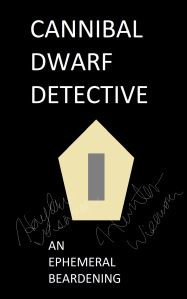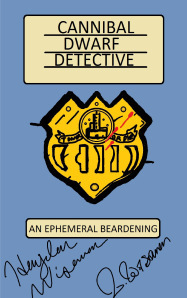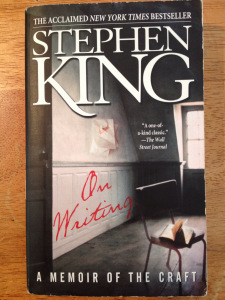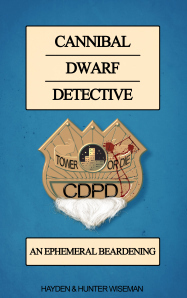How to Write Trash – The Making of Cannibal Dwarf Detective: An Ephemeral Beardening
Origins in blasphemy:
My brother Hunter was writing a paper about his spiritual perspectives for a class. He had chosen to write about Buddha, Jesus, and other spiritual leaders. At a certain point he became frustrated with his paper and I offered to write while he dictated. What he said to me did not make it into the paper he would eventually turn in, but it formed the groundwork for what would become one of the dumbest projects I’ve ever participated in.
“Once upon a time there was this guy named Buddha,” Hunter began. “He did some things. Those things were very good for him. He became a monk.”

Hunter and I spent many hours working on the cover. This was one of the original ideas. We did our mock ups all in one night and concluded designing around 5am.
“He did some things as a monk,” he said. “Also, he killed 80,000 people with his bare hands and drank their blood.”
“Are you typing what I’m asking you? Buddha as a monk, he did some things, and became enlightened (from the blood drinking) and then he became really fat and got old and died. Before that, though, he wrote a book, or whatever. The end.”
The dictation was, of course, a factually inaccurate telling of the Buddha’s journey of enlightenment. I’ve learned a lot about Buddhism since then and know the real story to be far less… absurdly violent.
The Buddha, then Siddhartha Gautama, was sheltered for many years. He had supposedly never seen sickness, or an old person, or death. One day he left the comfort of his palace and rode out with Chandaka, his charioteer, and witnessed the suffering of the world firsthand.
The charioteers name would eventually become the name of the planet our novella would take place on. Read into that what you will.
Writing a novella:
“I don’t really know,” Hunter said when I asked him when the moment was that we decided to write a book. “I don’t even remember it becoming like… a book.”

The mock up that we put the most work into.
I can’t recall how we got here either. It started as a joke. Then one joke became two. So on and so forth. Every time we traded places at the keyboard I think our goal was to come up with more and more ridiculous scenarios to make each other laugh.
“I don’t think there was a moment where we said, ‘hey, we should publish this.'” Hunter said.
“But I think there was,” I said. “We did end up publishing it after all.”
“I know,” Hunter said. “But I don’t remember when that was.”
The novella took took three years to write.
“Why do you think it took so long?” I asked.
“For a while I don’t think we had any direction,” Hunter said. “We wrote a bunch of nonsense and it became difficult to piece together. There were times when we sat down to write and ended up just talking about it. Plus we were both in school. We just had other shit going on.”
I recall a sketchpad filled with names and badly drawn maps. We tried separating the characters into factions (beyond what was in the book) to better keep track of what was going on but eventually gave up on that. The book didn’t take itself as seriously as we were trying to. Tolkien-esque world building was never in the cards.
On creative influences:
The things that influenced me in writing this train wreck are obvious in retrospect. Lord of the Rings, horror, shock humor, bad puns, wordplay, and of course crime dramas. It ended up being more of some of those things and less of others.
I asked Hunter what he wanted the book to be.

This book was crucial as an influence and in guiding the editing process for Cannibal Dwarf Detective. I had read it right before we started the first draft. It is said that Tim and Eric of Adult Swim’s “Tim and Eric Awesome Show Great Job!” created that show after finishing film school and wanting to implement the opposite of all they had learned. I followed a similar philosophy here. I plan on applying King’s knowledge of writing in a more accurate way in the future.
“Before we even had a title,” he said. “I wanted to write a noir detective story. You know, realistic. And then you started adding dwarves and cannibalism. I was fine with that, but then you started scalping people and putting the scalps in [Jeac's] beard. I don’t know.”
“Did I ruin the book?” I asked.
“No you just made it into something different.”
Revisions:
The first draft was a mess. A stream of consciousness with little punctuation, paragraph, or page breaks. We ended up with three drafts of the book. And then two more after its publication. I kept finding mistakes and wanting to fix them.
A book is never finished as it turns out. Like any creative endeavor there is a time when you have to just stop and call it good.
There are parts of the book I wish I could have elaborated on and made more dense, but I’m not sure that would have benefited the book. Its speed is part of what I think makes it so readable. Hunter wanted more from certain characters and arcs as well.
“I wanted to expand Ja-La Pe-Pe Ecko Sanders more,” he said. “Why would a character have such a cool name and then just be killed off immediately? I don’t feel like we used him as well as we could have. We gave him a bit of back story and then never bring it up. He’s a rancher and he has that basement full of weapons. He might just be the coolest character, but we didn’t do anything with him.”
Editing:
Making a revision is not editing. You might do what you would call editing when making a revision to a draft, but editing itself can be a much heavier task. That’s why, after Hunter and I finished the first draft, we asked Jared Larson, a freelance contributor at IGN.com, if he would like to edit for us.

The final cover by TJSGrimm.
I did most of the editing on subsequent drafts and I feel kind of guilty subjecting Jared to the mess that was the first. In the future I’ll do as much editing on the first draft as possible, pass it on to someone else, then return to it before writing the next draft.
“It was a tad bit rough,” Jared said of the first draft. “The lack of commas was definitely my biggest frustration. Sometimes I felt like I was reading Hemingway, if Hemingway had just snorted several lines of coke and taken a handful of LSD.”
Jared told me the editing process was long.
“It’s not a long story,” he said. “But looking for grammatical and spelling errors, as well as narrative issues, made it a bit of a doozy. Not so much because of the volume of errors as because of the time it took to write the reason for the edit and suggested alternatives.”
Because Cannibal Dwarf Detective is written in an unorthodox way and I wanted to break the rules in Stephen King’s On Writing it created challenges for Jared.
“There were quite a few times where I pointed out an inconsistency or objective error and the brothers shrugged and responded, ‘We’ll keep that. It’ll be funny.’ No matter how many times I argued that nobody would get it, I almost never changed their minds.”
Despite his frustrations with our incompetence, Jared did enjoy working on the project. He marked specific parts in the first draft that made him laugh to counter his criticisms. A spoonful of sugar.
“Jeac’s odd behavior usually made me chuckle,” he said. “And I’m pretty sure the constant abuse at the hands of his boss got some laughs out of me.”
Jared said he would work with us again in the future and offered this final take:
“Director Alejandro Jodorowsky wanted to make a film adaptation of Dune that would give viewers acid-like hallucinations without the need for drugs. I would argue that Cannibal Dwarf Detective accomplishes that. I think I know what it feels like to watch Adult Swim cartoons while high as balls now.”
Cannibal Dwarf Detective: An Ephemeral Beardening is available on Kindle. You can get it here.
Like Cannibal Dwarf Detective on Facebook!





